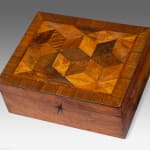








The lid with geometric parquetry veneers of exotic timbers (including three different palm samples) and crossbanded in rosewood, the front with a lock (with key), opening to reveal an interior lift-out tray with nine compartments, each with a different solid specimen wood lid with a bone knob handle, each identified with a handwritten paper label.
We are grateful to Dr. Adam Bowett for his research below on the various woods. Labels, common names and botanical names are as follows:
Yellow Sanders (Satinwood) - Zanthoxylum flavum Vahl.
Braziletta (Braziletto) - Guilandina spp.
Yacca (Yacca) - Podocarpus purdieans Hook.
Ebony (Cocus wood) - Brya ebenus (L.) DC
Mahoe (Hibiscus) - Talipariti tiliaceum (L.) Fryxell
Cashaw (Cashew) - Anacardium occidentale L.
Juniper Ceader (Juniper, cedar) - Juniperus barbadensis L.
Jamaica Mahogany (Mahogany) - Swietenia mahagoni (L.) Jacq.
Grey Sanders (?) (?) - Terminalia tetraphylla (Aubl.) Gere & Boatwr.
A very similar box by Turnbull bearing the maker's label and containing a hand-inscribed drawing cataloguing the woods used (in the same script as the labels on lids of this box) was sold at Christie’s London, 26th October, 2010 (lot 124).
Ralph Turnbull (b.1788 - d.1865) was the most recognised and important of all the furniture makers of the nineteenth century in Jamaica. He created a style that combined adaptations of British designs with the use of exotic indigenous timbers to dramatic effect. Turnbull was probably of Scottish birth, as he practiced as a Scottish Methodist. Where in Scotland he was born and anything else of his early life remains unknown. It is certain he arrived in Kingston, Jamaica in 1815 and set up a furniture business with his brothers, Thomas and Cuthbert. By the mid 1820s he was working alone (it appears the brothers had fallen out) and Ralph continued on his own until the 1830s when he worked with his brother, Thomas, again. In 1834/5 Ralph’s eldest son joined the business and later in 1844, when Ralph's youngest son, Robert came of age he too joined his father, brother and uncle in the family business. Tragically, in the same year, 1844, Ralph Turnbull senior lost both his sons. The company name remained the same, ‘Ralph Turnbull and Sons’, until 1 January, 1852 when Ralph changed the company name to ‘Turnbull and Lee’. William Lee was Ralph Turnbull’s son-in-law by marriage to his daughter, Isabel. By 1852 Turnbull was 64 years old and a very old man, even more so by Jamaican life expectancy standards. Ralph Turnbull died in Kingston, Jamaica in 1865 at the age of 77.
Thomas Coulborn and Sons previously sold an important 19th Century Jamaican Inlaid Centre Table by Ralph Turnbull to the Museum of Fine Arts, Boston.
We are grateful to Dr John Cross for his research on Ralph Turnbull.